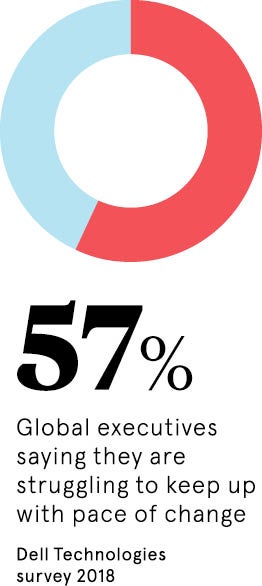According to LinkedIn, there are 121 chief transformation officers in the UK, along with hundreds more business transformation officers, digital transformation officers and the like.
But it’s not a job title that’s been around for very long, emerging over the past decade or so as organisations realise the need to be more responsive to change. A 2013 survey by consultancy firm McKinsey found that more than eight out of ten executives had experienced an organisational redesign in their current companies, and more than half believed they would experience another in the next two.
“We’re all living through intense change, the pace of which is only accelerating,” says Jason Dormieux, global chief transformation officer at media agency Wavemaker. “Regardless of title, all companies need people whose obsession is around what products and services they can build in order to help their customers take advantage of the opportunities that this disruption brings.”
Regardless of title, all companies need people whose obsession is around what products and services they can build in order to help their customers
But what does this mean in practice? Where do the people come from to fill these roles, and what exactly are they doing?
Diletta D’Onofrio, head of digital transformation at software company SnapLogic, says: “Typically, people come to it from management consulting. I recommend a period in consulting where you’re exposed to multiple realities. To me, it’s important that you have seen not just one organisation but five or ten, ideally. And industry experience is important: you can specialise by industry.”
In other cases, chief transformation officers come up through the ranks: “Knowing the company you are working in can be beneficial, as you are likely to understand its critical architecture from an IT and business process perspective and have constructive relationships with key stakeholders which can expedite the decision-making process,” says Lauren Chiren, director of support group Women of a Certain Stage, who has worked as head of transformation at three banks.
“Understanding the company’s risk appetite and internal processes around finance, resourcing and procurement can often save time too.”
The term chief transformation officer has a wide meaning: some CTOs see themselves as visionaries, while others are essentially project managers for an overhaul of an organisation’s processes, often through technological change.

Richard Cross of advertising company Clear Channel International says: “My role as chief digital transformation officer is to make sure Clear Channel International builds the capabilities needed to be at the forefront of our technology-driven transformation.
“This covers everything from understanding how technology is impacting the company’s culture, to encouraging a start-up mindset across the business to be more experimental. My job didn’t exist before I joined, so I’ve had some flexibility in defining what the role entails.”
In some cases, chief transformation officers form a permanent part of a company’s C-suite, tracking how a company is performing following change. In a recent survey carried out by McKinsey, only 37 per cent of respondents believed that their business transformations had been successful, and there’s a clear consensus that long-term monitoring of change is essential for success.
In other cases, a chief transformation officer is hired for a particular project or set of projects – in which case success can mean doing yourself out of a job.
“A really good one does it in one to two years, a bad one in maybe five years,” says Ms D’Onofrio. “I know quite a few people in these types of roles, and they tend to be looking for a new job in the third year.”
The good news, though, is that there are likely to be plenty of other positions to apply for. According to McKinsey, companies revamp their organisations more often than they overhaul their websites or upgrade their computer systems.
Ms Chiren says: “Technically, a great transformation officer will be forever innovating.”






